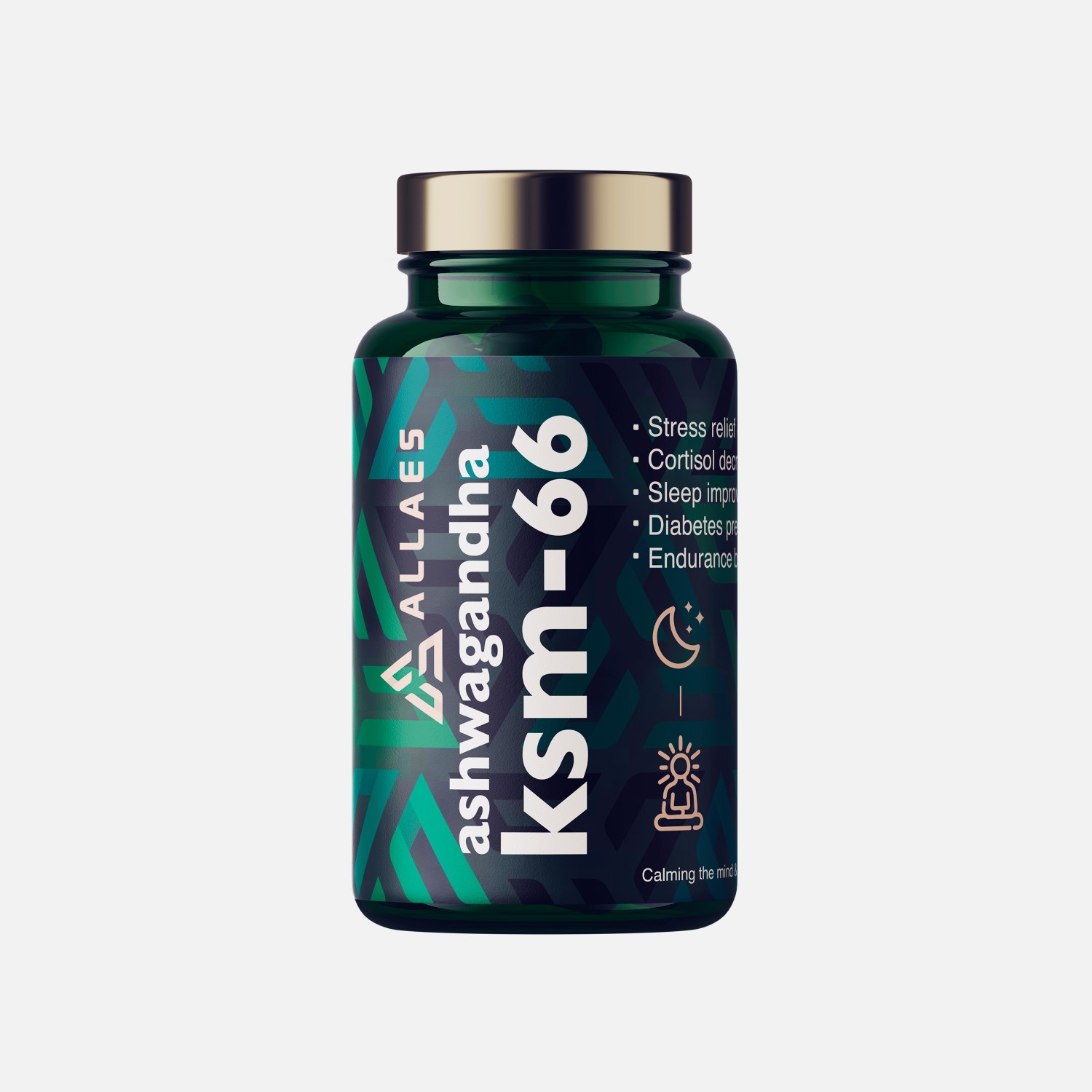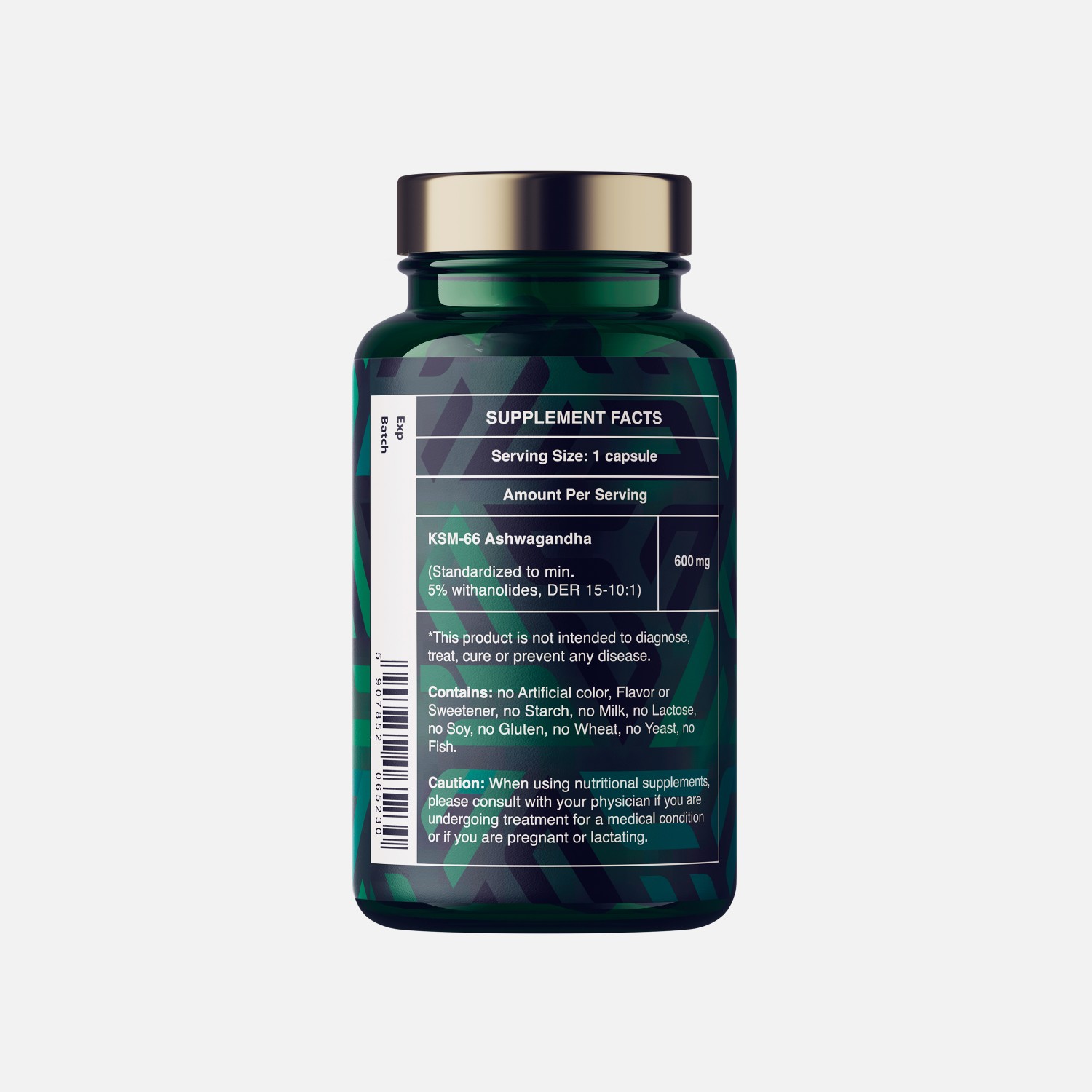



- Stock: In Stock
- Package: 600 mg / 60 capsules
Ashwagandha – a science-backed adaptogen for combating stress, fatigue, and anxiety
Ashwagandha (Withania somnifera) is one of the most extensively studied plants, widely used in both medicine and sports, known for its adaptogenic and neuroprotective properties. As an adaptogen, it helps the body cope more effectively with physical and psychological stress, recover after exertion, and maintain hormonal balance by lowering stress hormone levels and increasing testosterone—a hormone also responsible for recovery processes.
Ashwagandha offers numerous benefits that can improve quality of life even in people without major health issues. It is a versatile supplement that supports overall well-being, helps preserve health and energy, and protects the body from the effects of stress, inflammation, and age-related changes. The effects of ashwagandha are backed by scientific research, with studies growing in number every day.
Who can benefit from ashwagandha?
✔ If you experience high stress, anxiety, or irritability – ashwagandha can help lower cortisol levels, improving your emotional state by relieving excess tension. you’ll feel calmer and more recovered.
✔ If you have sleep problems or insomnia – it can help you fall asleep faster and improve sleep quality.
✔ If you need to increase testosterone levels – ashwagandha supports hormonal balance by raising testosterone, giving you an extra boost of energy and strength.
✔ If you’re physically active – it can enhance endurance, recovery, and protect muscles from catabolism (breakdown).
✔ If you have high blood sugar or are prone to diabetes – ashwagandha can improve insulin sensitivity and help lower blood sugar levels.
✔ If you want to support brain health and protect it from aging – its neuroprotective effect contributes to better memory and cognitive function.
✔ It can also support your cardiovascular system by increasing your VO2max – the amount of oxygen your body can consume and use per minute during intense physical activity.
How does ashwagandha work?
Adaptogens are substances that help the body cope with stress without depleting its resources. Think of them as a personal trainer for your nervous system: instead of simply "numbing" stress, they teach your body to respond to it more efficiently. Every day we face various stressors—physical, emotional, mental—that trigger prolonged cortisol release. Cortisol, our main “stress hormone,” spikes, the heart beats faster, energy is redirected toward defense mechanisms, and if stress becomes chronic, we end up feeling tired, irritable, and burned out. This is where ashwagandha’s adaptogenic properties come into play.
If the body is a complex mechanism, adaptogens work like “lubrication” that helps all its parts function more smoothly. Ashwagandha improves endurance, enhances stress resilience, supports better sleep and focus, increases oxygen consumption capacity, boosts immunity, and even promotes longevity. It is particularly known for lowering cortisol levels, making it highly effective against chronic stress, anxiety, and insomnia. It helps you relax without causing drowsiness—on the contrary, it helps your body stay energized and balanced.
Difference from stimulants and sedatives
Adaptogens don’t work like caffeine or stimulants that simply give a temporary energy boost. They don’t push the body into a “forced mode,” but instead regulate its function so you can adapt to stress without overloading. Adaptogens help normalize the body’s response: if your energy is too low, they help increase it; if it's too high and you're on the verge of panic, they help you calm down. They work gently, yet effectively, and their benefits usually build up over time.
Unlike synthetic sedatives, ashwagandha doesn’t “shut down” your nervous system. Instead, it helps the body calm itself naturally, without causing dependence or side effects.
How to take ashwagandha correctly
Studies have not found serious side effects even with doses up to 12 grams per day, but manufacturers generally recommend starting with 600 mg per day.
- Recommended dose: 600 mg per day.
- Maximum dose: Up to 3 g per day (depending on individual tolerance).
- Best time to take: Evening is preferable, as it promotes relaxation and improves sleep.
- How long to take it: Adaptogens typically work gradually and cumulatively. Taking one capsule won’t bring an immediate effect. But with regular use for at least 2–3 weeks, you may notice reduced anxiety, better sleep, and improved stress resilience. Currently, there are no studies indicating strict limits on the duration of ashwagandha use. Most recommendations suggest taking it for at least 4–12 weeks.
Composition matters!
As you may know, ashwagandha is an herb, and one of the main challenges with plant-based raw materials is the variability in the content and concentration of active compounds. Due to the lack of quality standards, the composition and potency can vary significantly, making accurate dosing difficult and potentially reducing the effectiveness of herbal products. However, we’ve solved this issue in our product.
We use KSM-66 — the most well-known standardized ashwagandha extract on the market, recognized for its quality and effectiveness. It is produced using a unique extraction process that preserves all the important components of the plant and delivers a high concentration of active compounds such as withanolides.
What problems does ashwagandha help solve?
Reduces stress and anxiety, improves mood
Chronic stress leads to elevated cortisol levels, which causes irritability, anxiety, sleep problems, and abdominal fat gain. Ashwagandha helps lower cortisol levels, promotes relaxation, stabilizes mood, and increases the body's resilience to stressors.
Study: A 60-day intake of ashwagandha reduced cortisol levels by 27.9% in people with chronic stress
Improves sleep quality and combats oxidative stress
If you often wake up at night, take a long time to fall asleep, or don’t feel rested, ashwagandha may help. It increases GABA levels, reduces nighttime cortisol activity, and helps regulate circadian rhythms—supporting quicker sleep onset and deeper, more restorative sleep.
Study: Ashwagandha improved sleep quality in people with chronic stress, increasing sleep duration and reducing sleep latency
Increases testosterone and enhances athletic performance
In men, ashwagandha stimulates testosterone production, improves fertility, libido, and recovery after physical exertion. In women, it helps balance estrogen and progesterone, making it useful for PMS, menopause, and reproductive issues.
Study: Ashwagandha increased testosterone levels by 15% and improved LH and FSH markers in men
Supports cardiovascular health and improves endurance
Ashwagandha helps lower blood pressure, reduce cholesterol, and support heart health. It also increases VO2max—the maximum amount of oxygen the body can use during intense exercise—which boosts endurance and recovery.
Study: Ashwagandha significantly increased VO2max in athletes and low-activity individuals, which is directly linked to long-term health and lower cardiovascular disease risk ?
Protects the brain from stress and aging, improves cognitive function
Chronic stress and oxidative damage accelerate brain aging by damaging neurons. Ashwagandha’s neuroprotective properties help improve memory, focus, and mental clarity while reducing the risk of neurodegenerative diseases like Alzheimer’s and Parkinson’s.
Study: Ashwagandha reduced oxidative stress markers and improved cognitive function in patients with neurodegenerative disorders?
Lowers blood sugar and improves insulin sensitivity
Elevated cortisol and chronic stress reduce insulin sensitivity, leading to type 2 diabetes, weight gain, and metabolic disturbances. Ashwagandha helps regulate blood sugar and improves insulin response, especially in overweight individuals or those with prediabetes.
Study: Ashwagandha lowered blood glucose, improved HbA1c, and normalized lipid profiles
Use for PEDs Users
Good news for fans of high-androgen steroids—especially trenbolone. Ashwagandha can genuinely reduce rage episodes, anxiety, and sleep issues often associated with steroid use. It also counteracts the cortisol surge from intense, high-frequency training, which otherwise contributes to fatigue, catabolism, and systemic inflammation.
Ashwagandha blunts excess cortisol release, speeding up recovery, reducing fatigue, and preserving muscle mass. It also supports cardiovascular endurance and oxygen utilization—helpful when using compounds that increase red blood cell count and hematocrit.
The result? Better recovery, calmer emotions, deeper sleep and stronger resilience. Overall, this supplement is so effective and beneficial that you’ll feel its positive effects even while using PEDs!


